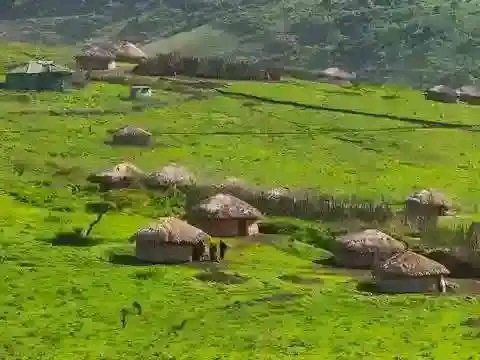Gembu, perched high on the majestic Mambilla Plateau in Taraba State, stands out as one of Nigeria’s most breathtaking and tranquil towns. With an elevation of about 1,800 meters above sea level, this serene town offers a climate and landscape unlike any other part of the country. Located near the borders of Cameroon, Gembu is nestled in the heart of nature, surrounded by lush hills, whispering pine trees, and gentle valleys.
Often referred to as the “Switzerland of Nigeria,” Gembu provides a refreshing escape from the usual tropical heat found in most Nigerian regions. Its uniqueness lies in its weather, peacefulness, and the simple yet fulfilling lifestyle of its residents.
The Weather in Gembu
How Cold Does It Get?
Gembu’s weather is its signature. On a typical morning, temperatures can drop to as low as 10°C (50°F) or even lower during the harmattan season. Visitors are often amazed to see fog rolling over the hills and people dressed in jackets and sweaters — a rare sight in Nigeria.
Morning Frost and Sweater Weather
The chill in Gembu is especially felt in the early hours of the day and late evenings. Frost occasionally forms on the grass, and locals often gather around fires to stay warm. The town’s climate is a major draw for those seeking a cooler environment, especially during Nigeria’s hot season.
Why Gembu is So Cold
High Altitude and Geography
The cold in Gembu is primarily due to its high altitude. At nearly 6,000 feet above sea level, Gembu sits at one of the highest points in Nigeria. The Mambilla Plateau acts as a natural air conditioner, reducing humidity and enhancing the cool, fresh air.
Comparisons with Other Nigerian Cities
While cities like Lagos, Abuja, and Port Harcourt regularly experience temperatures over 30°C, Gembu remains refreshingly cool throughout the year. It’s often cooler than Jos, Obudu, or even some parts of Southern Africa during certain seasons.
Life on the Mambilla Plateau
What Makes the Plateau Special
The Mambilla Plateau is an ecological marvel — with rolling green hills, sprawling tea plantations, and rich volcanic soils. It’s a region untouched by urban sprawl and pollution, making Gembu a haven for relaxation and simplicity.
Everyday Lifestyle in Gembu
People in Gembu live a peaceful life, mostly engaging in agriculture and livestock rearing. Community life is strong, with families and neighbors supporting each other. The pace is slow, giving residents and visitors time to connect deeply with nature and themselves.
Agriculture and Farming in Gembu
Crops Grown Due to Cool Climate
Thanks to its temperate climate, Gembu is ideal for growing crops not typically seen in most parts of Nigeria. This includes Irish potatoes, cabbages, carrots, and strawberries. The cool temperatures help preserve soil moisture and reduce pest invasions.
Tea Plantations and Cattle Grazing
Gembu is also known for its tea cultivation. The Mambilla Beverages Tea Estate produces Nigeria’s only locally grown tea — Highland Tea. In addition, the town supports pastoral farming, with large tracts of grassland ideal for grazing cattle and sheep.
The People and Culture of Gembu
Ethnic Diversity and Warm Hospitality
Gembu is home to diverse ethnic groups, including the Mambilla, Fulani, Kaka, and Hausa communities. Despite this diversity, the people are known for their hospitality, warmth, and friendliness.
Languages Spoken and Community Life
While Hausa and Fulfulde are commonly spoken, many also use local dialects. The community is tightly knit, and traditional values such as respect for elders and community gatherings remain strong.
Tourism in Gembu
Attractions and Natural Beauty
From misty hills and dense forests to scenic cliffs and valleys, Gembu is rich in natural beauty. Visitors often come to enjoy the landscape, take long walks, and disconnect from city life.
Why Travelers Love the Serenity
Unlike busy tourist hubs, Gembu offers quietude. There’s no honking traffic or urban chaos — just the soothing sounds of birds, rustling leaves, and distant cowbells.
Must-Visit Places in Gembu
- Gashaka-Gumti National Park – Nigeria’s largest national park
- Tea Estates and Viewpoints – perfect for photography
- Local Markets – offering fresh produce and crafts
- Yelwa Rock Formations – a stunning natural attraction
Local Cuisine and Delicacies
Traditional Dishes to Try
Local meals include tuwo (a thick cornmeal dish), miyan kuka (baobab soup), and grilled meat prepared by Fulani herders. Tea from the Mambilla plantations is a must-try.
How Climate Influences Food Choices
The cooler climate allows for storage of perishable food and dairy. Meals tend to be hearty and warm — perfect for the chilly weather.
Wildlife and Nature Trails
Gembu’s surrounding forests and parks are home to animals like baboons, antelope, and exotic birds. Several trails around the plateau make it ideal for nature walks, birdwatching, and hiking.
How to Get to Gembu
Traveling to Gembu can be an adventure. From Jalingo, the Taraba State capital, one can travel via Serti through winding roads with breathtaking views. While parts of the road are rough, the journey is part of the experience.
Best Time to Visit Gembu
The best time to visit is between November and April when the air is dry and the skies are clear. This period offers the coolest temperatures and great visibility for sightseeing.
Accommodation in Gembu
There are a few guest houses and small lodges in the town. Some visitors also enjoy staying with local families, giving them a deeper cultural experience.
Safety and Travel Tips
Gembu is generally safe, but here are some quick tips:
- Carry warm clothing, even during the day.
- Bring a first-aid kit for mountain travel.
- Travel with a local guide if exploring remote areas.
Economic Importance of Gembu
Gembu plays a significant role in Nigeria’s agriculture and tea industry. Its fertile land supports both food and cash crop production, contributing to local and regional economies.
Environmental Conservation
With its rich biodiversity and fragile environment, Gembu is seeing increasing interest in eco-tourism and sustainable farming. Local efforts are being made to preserve the plateau’s ecosystem.
The Future of Gembu
Gembu holds vast potential for development in tourism, agriculture, and conservation. With more infrastructure and awareness, it could become a top eco-tourist destination in West Africa.

Frequently Asked Questions
1. Is Gembu really the coldest town in Nigeria?
Yes, due to its high altitude, Gembu experiences the lowest temperatures of any Nigerian town, especially at night and during harmattan.
2. How do I travel to Gembu from Abuja or Lagos?
You can fly or drive to Jalingo and then proceed to Gembu via road through Serti. It’s a scenic, mountainous route.
3. What kind of clothes should I pack for Gembu?
Warm clothing like sweaters, jackets, and covered shoes are essential, even during the day.
4. Is it safe for tourists to visit Gembu?
Yes, Gembu is peaceful and welcoming. However, it’s advisable to travel in groups or with a guide.
5. Can I buy local tea in Gembu?
Absolutely! Highland Tea, grown and processed locally, is available in many shops and makes a great souvenir.
6. Are there hotels in Gembu?
Yes, there are basic lodges and guesthouses. For a richer experience, some tourists prefer homestays with local families.

Why You Should Visit Gembu
Gembu is more than just the coldest town in Nigeria — it’s a sanctuary of beauty, peace, and cultural richness. With its alpine-like weather, stunning landscapes, and kind-hearted people, it offers a unique escape from the norm. Whether you’re an adventurer, nature lover, or someone seeking peace and quiet, Gembu is the perfect destination.
